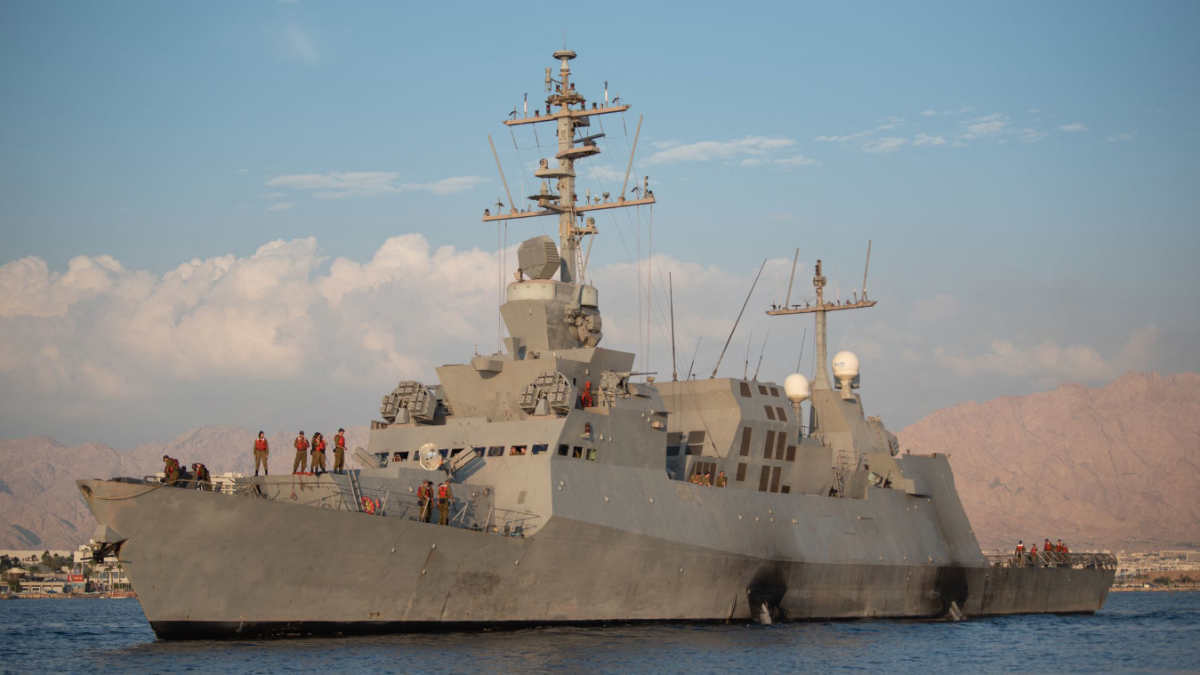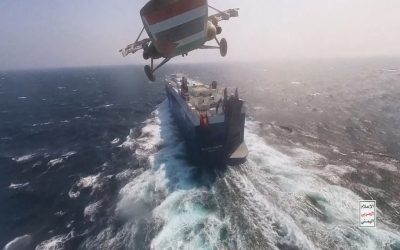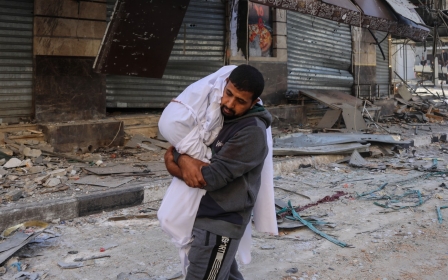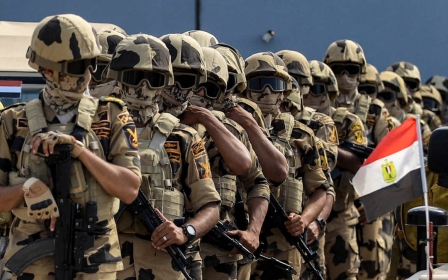Israel-Palestine war: Western officials privately warn Houthi attacks on shipping lanes will continue

Western officials are privately telling members of the shipping industry to continue to expect Houthi attacks on vessels in the Red Sea, according to two senior Arab and western officials, who requested anonymity when speaking with Middle East Eye about the private conversations.
The warnings, the officials say, reflect a predicament for the Biden administration, as it scrambles to deter the Houthis after they launched an hours-long attack on three commercial ships in the Red Sea on Sunday.
A US Navy destroyer also came under attack after it arrived at the scene and shot down three drones fired from Houthi-controlled Yemen.
“The Biden administration is concerned that direct strikes on the Houthis or re-designating them a terror organisation in retaliation could imperil not just the Yemen peace process, but the wider Iran-Saudi Arabia rapprochement,” a senior western official familiar with thinking in Washington and Arab capitals told Middle East Eye.
MEE reached out to the State Department for comment on this article but didn't receive a reply by the time of publication.
New MEE newsletter: Jerusalem Dispatch
Sign up to get the latest insights and analysis on Israel-Palestine, alongside Turkey Unpacked and other MEE newsletters
The Houthi attacks on commercial shipping vessels are a particularly exasperating test of the Biden administration’s deterrence capabilities, Arab and western officials say.
'Hezbollah is like the sports car and the Houthis are the pick-up truck'
- Arab official close to US
The last time the US publicly took military action against the Houthis was in 2016, when it launched Tomahawk cruise missiles at Houthi coastal radar sites after a US warship came under attack.
Today, Arab and western officials say the Biden administration is reluctant to launch such strikes against the Houthis because they fear it could derail the peace process between them and Saudi Arabia.
“The Biden administration is way more comfortable using force against Iranian proxies in Iraq and Syria than Yemen,” Michael Knights, an expert on Iranian-backed groups at the Washington Institute for Near East Policy, told MEE.
“The Houthis have worked out they can pretty much do whatever they want and not face consequences. For the Biden administration, it's a nightmare deterrence dilemma,” he added.
Saudis shrug off maritime attacks
Yemen descended into civil war in 2014 when the Iran-aligned Houthis seized Yemen's capital, Sanaa. A year later, Saudi Arabia led a coalition of Arab states, including the United Arab Emirates, to restore the internationally-recognised government.
The Saudi-led coalition launched thousands of air strikes on Yemen which failed to dislodge the Houthis but resulted in hundreds of thousands of civilian deaths and a major humanitarian crisis. The Houthis responded by lobbing missiles and drones at civilian infrastructure in Saudi Arabia and the UAE.
A UN-brokered ceasefire expired last October, but the fighting has remained largely on hold.
Talks to end the war gained pace after the Saudis restored ties with Iran in March. Then, less than one month before the outbreak of fighting in Gaza, Houthi representatives made a rare visit to Riyadh, in a bid to hammer out the final details of a long-term truce.
Mohammed al-Basha, senior Yemen analyst at the Virginia-based research firm, Navanti Group, told MEE the US was at a "crossroads" as it weighs how to respond to the Houthi threat.
"We might be on the brink of an agreement with both the Saudis and the Houthis, leading US policymakers to exercise caution regarding the imposition of sanctions or the initiation of a military strike," he said.
On Tuesday, the Houthis' deputy foreign minister threatened to close the Bab al-Mandab Strait and said Houthi actions would continue until Israel's "aggression" in Gaza ends.
"This is the most direct threat we have seen from the Houthis since the war in Gaza erupted,” Basha added. “It will further test the Biden administration’s deterrence capabilities."
Houthi attacks 'months in making'
US officials have said the Houthi strikes were "enabled" by Iran but have also hit a de-escalatory tone.
On Monday, they sidestepped questions about whether a drone that was approaching the US warship responding to distress calls from commercial vessels on Sunday was an intended target of the Houthi attack.
However, the senior western official familiar with the Houthis suggested they would have hoped to inflict US casualties during Sunday’s attack, which appeared to be “months in the making” and demonstrated a sophisticated ability to monitor and map multiple vessels at sea and pre-deploy forces for attack.
'Across Yemen among Islamist groups, the Houthis are seen as heroes'
- Raiman al-Hamdani, Yemen expert
‘The Houthis have been building out their naval forces for this day and they have the equipment to keep going. These attacks will continue,” the official added.
Since the outbreak of the war in Gaza, there have been at least 76 attacks on US forces in Iraq and Syria. Although the attacks stopped during the temporary truce between Hamas and Israel, they resumed when the truce collapsed last week.
Even as the war in Gaza rages, the US has continued backchannel talks in Oman with Iran, an Arab official told MEE.
Initially, the Biden administration appeared reluctant to inflict casualties on Iranian-backed groups in response to their attacks on US assets, preferring to hit weapons depots and infrastructure.
Washington's calculus changed as the pace of attacks picked up, and some in Washington aired frustration that the US wasn’t doing enough to raise the stakes against Iranian-backed forces.
On Sunday, the US said it killed at least five Iranian-backed fighters in Iraq as they were preparing to launch a drone strike against a US base in Syria.
Houthis emerge as 'heroes'
The Houthi attacks are a bitter pill for the Biden administration to swallow because it made ending the war in Yemen a top foreign policy priority.
Biden removed the US terror designation on the Houthis and froze the sale of some offensive weapons to Riyadh in response to its Yemen bombing campaign.
Houthi influencers have posted videos of themselves wielding AK-47s and dancing on the deck of the hijacked Galaxy ship. In other clips, they are seen smoking shisha and handing out Qat, a local stimulant, to the hostages.
“If you are a Houthi militant right now, your head is up in the clouds," Raiman al-Hamdani, a Yemeni analyst and researcher at the ARK Group, told MEE. "Their performance since the Gaza war erupted has been a boon to Houthi propaganda.
“Across Yemen among Islamist groups, the Houthis are seen as heroes. Everything they are doing is extremely popular. They have disrupted $2bn worth of trade and forced Israel to divert its vessels out of the Red Sea.”
The Houthis have struck at the nuts and bolts of the US’s great power projection in the region: protecting sea lanes of communication.
“If you can’t guarantee freedom of movement in the seas, your superpower credentials are diminished,” Knights said.
US National Security Advisor Jake Sullivan suggested Washington’s immediate focus now is defending against future attacks, rather than striking Houthi positions in Yemen.
He said the US was in discussions with its allies to establish a naval task force to guard ships travelling through the Red Sea. The US is also dispatching Timothy Lenderking, its envoy for Yemen, to the Gulf this week to discuss maritime security.
Sullivan made a pitch for international help in dealing with the attacks, saying the three vessels targeted by the Houthis were not all necessarily tied to Israel, but linked to 14 different countries.
“This is an issue for the entire world, for every country that relies upon maritime commerce to sustain their economy,” he said. “By the way, that is every country.”
Analysts who spoke to MEE were sceptical about how the new task force would function. A multinational maritime force already exists policing the Red Sea, Bab al-Mandab and Gulf of Aden.
Another option for the US could be covert strikes, which the US has the capabilities in place to conduct in Yemen, the western official said, without providing further details.
'Things go bang in Yemen'
On Monday night, journalists in Yemen reported that four drone strikes had been carried out on five Houthi military sites in Sanaa. Saudi media attributed the attack to Israel.
"Things go bang in Yemen all the time,” Knights told MEE. “One can imagine if the US and Israel do something, they would do it on the covert,” he said, adding that the Houthis’ small naval boats, limited fleet of helicopters and drone storage facilities would be the most likely targets.
The US is widely considered to be conducting a covert drone programme in Yemen targeting members of al-Qaeda in the Arabian Peninsula.
In March, al-Qaeda said two of the militant group's operatives, including its media chief, were killed by a suspected US drone in central Yemen.
The Arab official close to the US told MEE that retaliatory strikes on the Houthis would be unlikely to deter the group.
“When you think of Iranian proxies, Hezbollah is like the sports car and the Houthis are the pick-up truck. Hezbollah has a comfortable position and doesn’t want to be bombed, the Houthis do not care.
“While most Iranian proxies are calculating what’s the least we can do to help Hamas and still show we are on their side, the Houthis are going as hard as they can, saying what’s the maximum we can do,” Knights said.
“They have tremendous pain tolerance.”
This article is available in French on Middle East Eye French edition.
Middle East Eye delivers independent and unrivalled coverage and analysis of the Middle East, North Africa and beyond. To learn more about republishing this content and the associated fees, please fill out this form. More about MEE can be found here.







